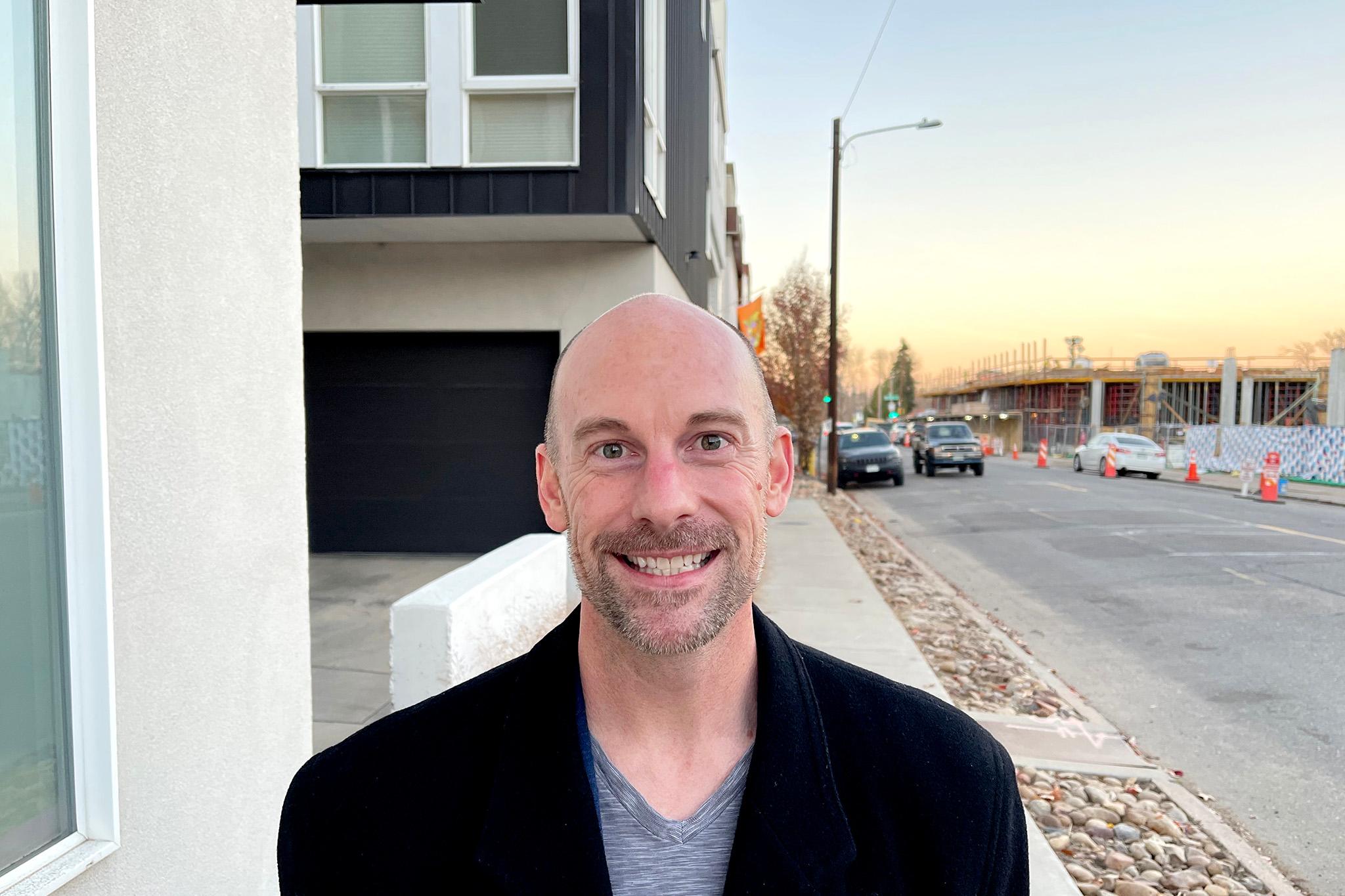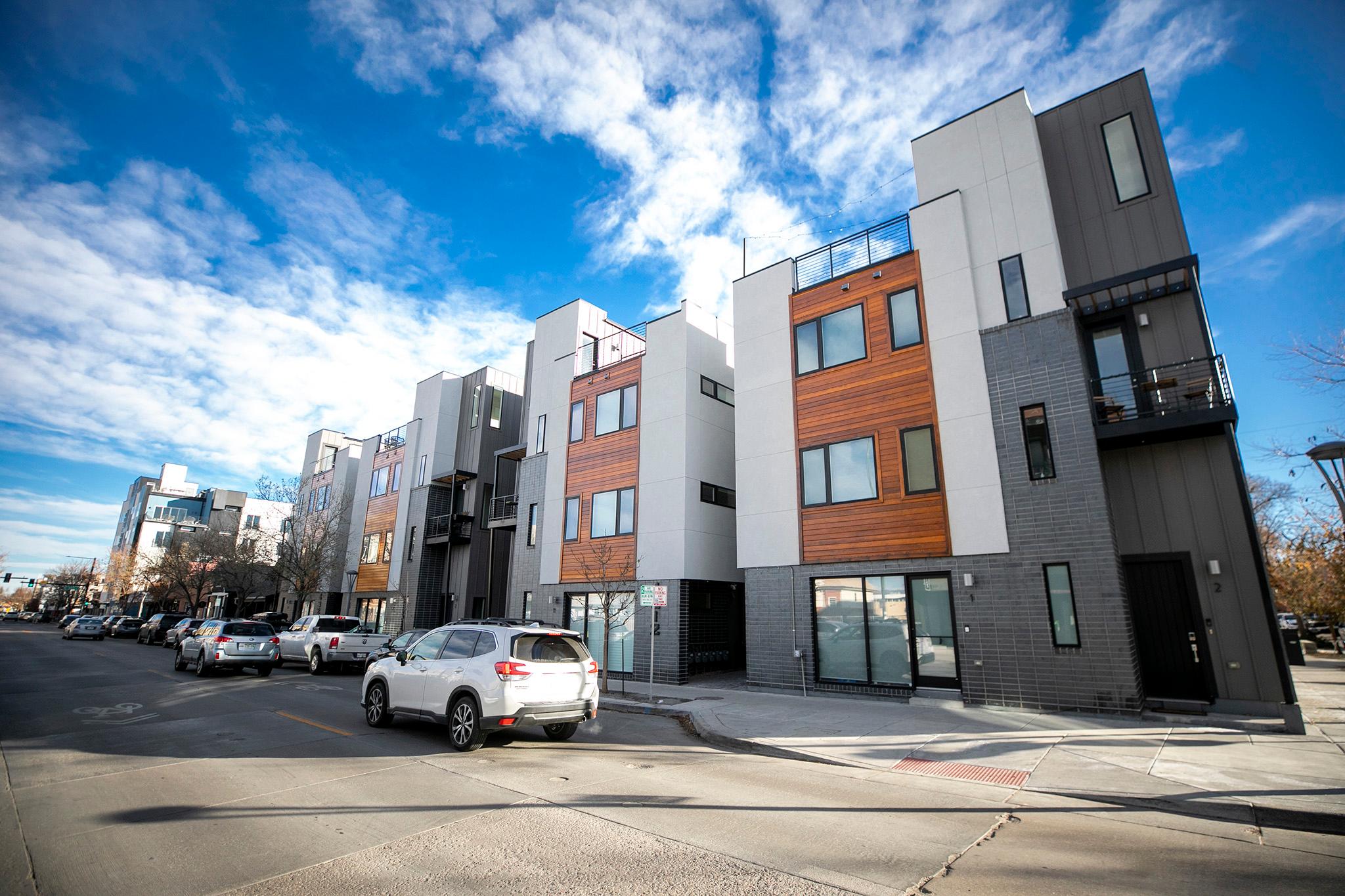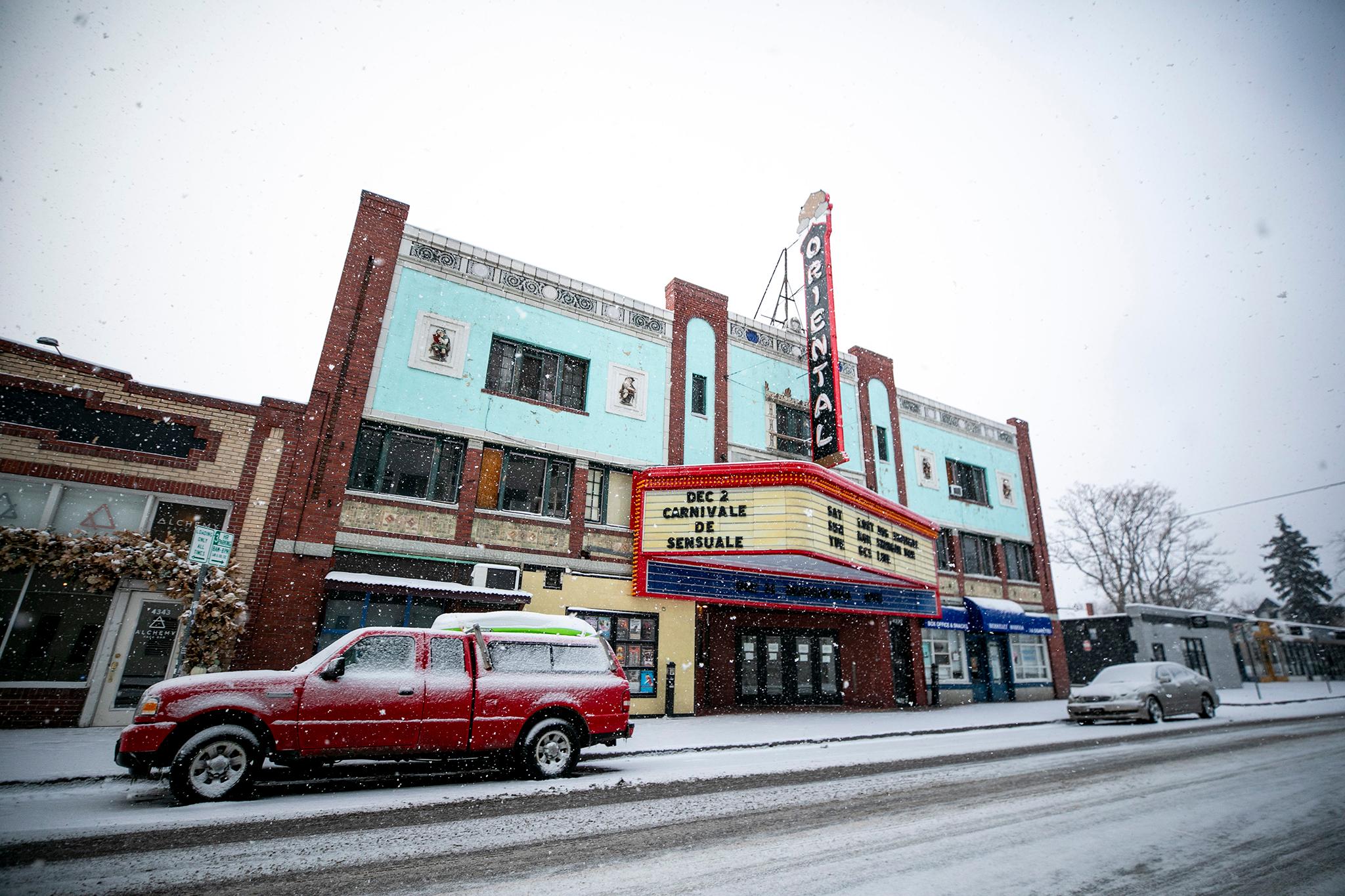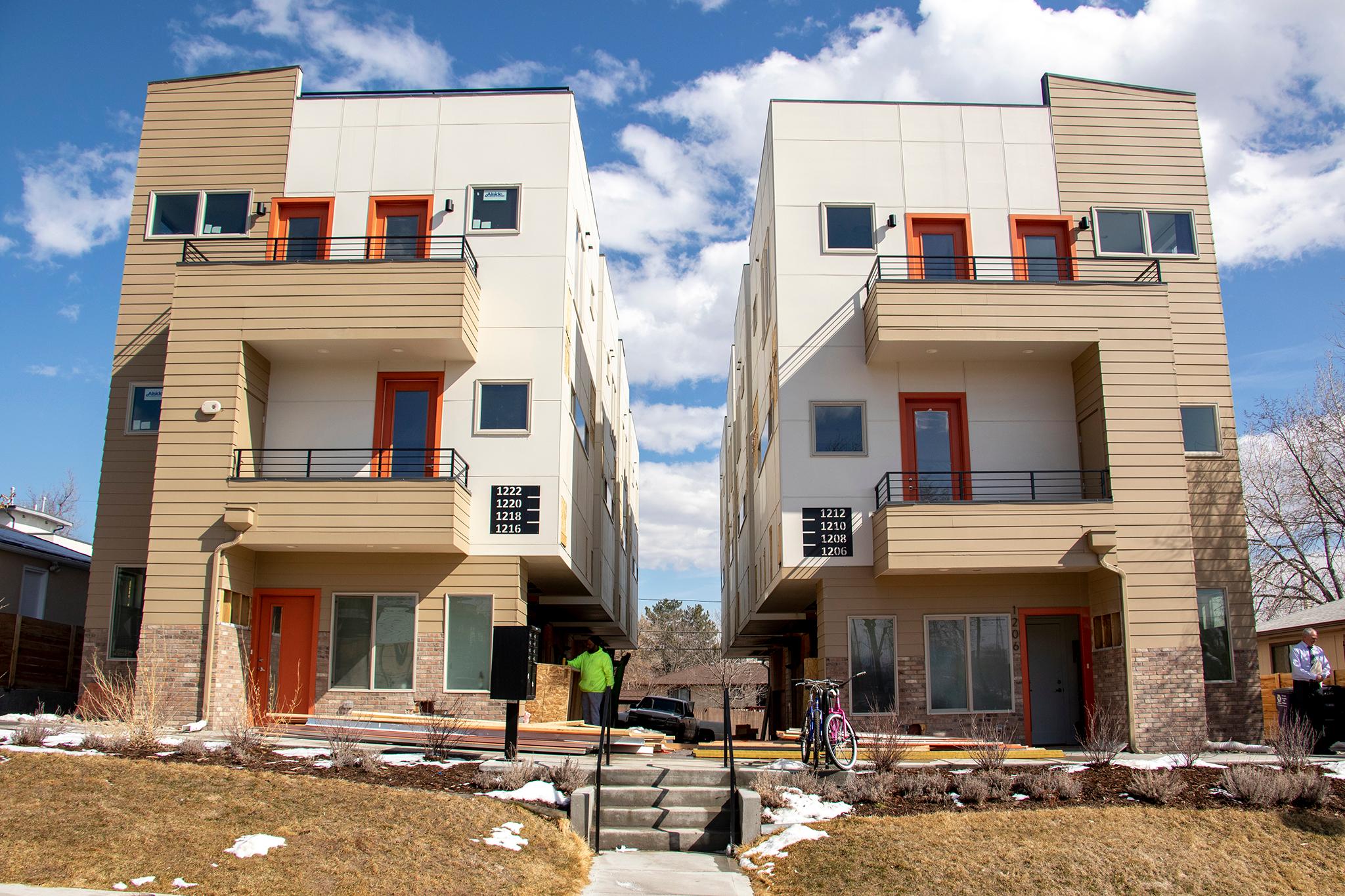This article is a part of Denverite's Street Week: Tennyson series. We're exploring the area by way of the history, people, carp-filled lakes and weird houses that define it. Read more Tennyson stories here.

Matt Koenig moved into his Tennyson Street slot home a few years before Denver City Council outlawed the architectural form in the name of preserving the city's character, even as other big-box-like structures, still permitted, overran much of historic Denver.
It was in 2015, when Denver housing prices were climbing fast from post-foreclosure-crisis lows. Koenig, a medical technology engineer who grew up near Winter Park, wanted to downsize from his single-family home at 23rd Avenue and Irving Street in the Sloan Park neighborhood.
He planned to sell and buy his next house with cash, but there was a problem.
"I could not actually outbid anybody for the smaller homes," he said.

So his realtor pointed him toward new row homes in a big, new rectangle building on Tennyson Street. Instead of doors opening onto the sidewalk, they faced other doors opening onto what marketing-savvy developers described as a courtyard and pretty much everybody else called a "slot."
Koenig had long frequented the mom-and-pop shops on Tennyson. He enjoyed the restaurants and the tiny bungalows that housed a mix of businesses and neighbors. The Berkeley neighborhood was a livable, walkable community.
"I thought it was really cool. I liked the layout," he said. "I loved the fact that I had mountain views from my rooftop."
Though he'd be losing a yard and some privacy, the trade-off between his single-family home and a row home was worth it. He could pay less and live in a multi-family building on an otherwise quaint block with a small-town feel.
Little did he know, all that would soon change, and big, boxy gray buildings like he lived in would turn blocks of Tennyson into a canyon of slothomes, until City Council intervened and banned them in 2018.
Slot homes may be the most maligned architectural form in Denver in recent years.
Critics see them as a sign of predatory development, slipshod building, city planning gone awry, and anti-community design.
In the opulent 2010s, they became the architectural symbol of what was going wrong with Denver -- and many cities across the country: Things were growing too fast, gentrification was pushing out long-time neighbors and their cute single-family homes, and a new skyline was rising with little care for aesthetics.
While more density allowed more people to be housed in a city that could not grow horizontally and helped curb the spike in housing costs, many blamed the city's population growth and rising cost of living on the arrival of ugly, multi-family buildings interrupting neighborhoods' style.
Buildings like the one Koenig moved into were described scornfully as "new Denver."
Developers liked this style of new housing because they could easily and somewhat cheaply create density on relatively small lots. Because these row homes were new and trendy enough, they could be sold at a higher cost than the sometimes deteriorating single-family homes they replaced.

The perk for Denverites was that homebuyers who had been priced out of the single-family home market could still find a deal on a nice place to live in a multi-unit slot home building.
Nostalgic residents, on the other hand, loathed these new buildings and in some cases the newcomers who populated them, saying both were destroying the character of the city.
Slot homes were so hated that City Council -- often thought of as being friendly with developers- outright banned the architectural style back in 2018.
That year Denverite reported on a string of publicly aired grievances about the design.
Then City Councilmember Paul López called them "an abuse of the zoning code... They robbed our neighborhoods of character, and they robbed residents of community."
The homes were derided for alienating residents from the communities they lived in by having their front doors exit into slots instead of in the streets.
"I hate slot homes," said Maggie Miller, an opponent to the design. "I hate them ... It feels like being in a canyon."
"It's as though they don't want us to come to their front doors," said another resident, Gertrude Grant. "Because they never come out, they never go out their front door, because there is no real front door."
While slot homes with no doors facing the street were banned, those that had at least one unit with a door to the sidewalk were allowed.
Kelly Wiliams and her husband Mark moved into one of those modified slot home units facing Tennyson four years ago.
"What's fun about the street is if you live here and you walk up the street a lot and go to the different places, it's kind of like the 'Cheers' effect," Williams said. "You walk in, and everybody's like, 'Hey, Kelly and Mark, how are you?' So it really feels like a community."
As a real estate agent, she's encountered plenty of old-timers who don't love the gentrification of the neighborhood that the slot homes represent. She wants some of the historical houses to be saved, but also notes that many of the properties that were replaced by rowhouses were falling into disrepair.
The benefit of the rowhouses, as she sees them, is that more people can live on a plot than they did in a single-family home, and more people can enjoy the walkable neighborhood.
Her biggest problem with the neighborhood: "It's hard to not go out too much."
During the pandemic, she and her neighbors started meeting outdoors at a local brewery and would shop to help keep local businesses afloat.

As she sees it, the arguments that the row homes would somehow undermine the feeling of community were overblown.
"We still watch out for each other like we're neighbors," she said.
One challenge all people living on Tennyson have faced, whether they're in row homes or single-family houses, is the constant noise of construction.
Across from Koenig and Williams' homes, the noise of digging and pounding is relentless. But they're eager to see what's coming: new neighbors, new businesses, more community.
Despite the saws and hammers and an increase in car traffic, Williams says she likes living in Berkeley because it's a cozy retreat from the bustle of Denver, just like it was designed to be more than a hundred years ago.
"What I love is it feels like a mountain town in the middle of the city," Williams said, echoing ads for the area that date back to at least the 1880s. "Like when you're walking up and down Tennyson Street, it's like you could be in Breckenridge walking the Main Street."
Koenig, who expected to live in a neighborhood with a small-town feel, has definitely had to adapt to Tennyson Street's rapid growth.
"I think it didn't really have an impact until everybody's trying to put their trash can, recycle can, and compost bin out in the alleyways and trying to find a spot to put yours has been a battle," he said.
Parking has also become a nightmare, and he worries that more neighbors moving into the new housing coming across the street will make it worse.
"Where there used to be a lot of parking, we're now getting into that Cap Hill density where it's hard to find anything," he said. "And I'm sure the neighbors on the side streets are not enjoying the impact."
Koenig hopes Berkeley preserves some of its older homes -- especially in the neighborhood, even as he's grateful for some of the new businesses the neighborhood's increasing density has attracted.
As for the law banning homes like his, he thinks it's a good idea. He's grateful the city changed the regulations on rowhomes, mandating that some front doors face the street.
"It kind of blocks off that community feeling when they're perpendicular to the street," he said.
The close proximity of your own windows facing those of neighbors also leads to some occasionally embarrassing encounters.
"You've got to be a little bit careful what you're wearing when you're walking around," he said.

More than once, news trucks have shown up on the sidewalk in front of Koenig's home.
"With this particular building, we were in the news a couple of years ago, because when the city decided to really start cracking down on Airbnbs, the two owners the city decided to make an example of were here in this building," he said. "And so we had news crews out here filming."
Koenig didn't really mind the Airbnbs. Guests were largely respectful, and they were never too crowded.
"But having news crews out here filming," he said, "I was like, 'What's going on? Was somebody murdered?"
Despite having a few gripes, Koenig loves a lot about his home, and he has no plans to move anytime soon. He has a tight-knit community and a view of the mountains and no homeowners association fees.
And homes like his, as he sees it, are helping to bring density to the city.
"Denver needs housing so desperately," Koenig said.
Read all the stories from Street Week: Tennyson here. (And dip into the Street Week archives with 2021's Morrison Road and 2020's Bruce Randolph.)













